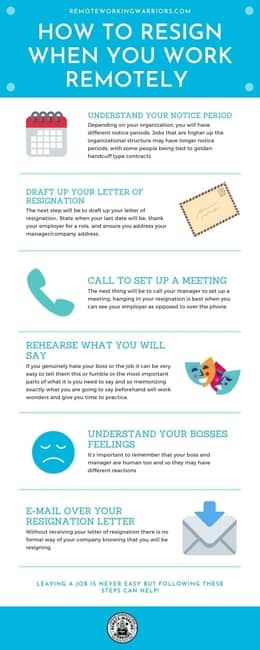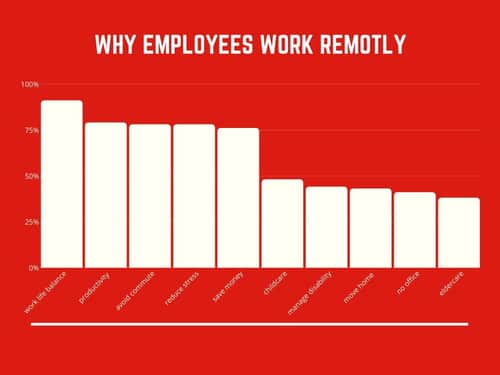This website is supported by its readers. If you click one of my links I may earn a commission. I am also a participant in the Amazon affiliates programme and I will also earn a commission from qualified purchases.

So one of the biggest fears I ever had was a few years back when I had to hand in my notice when working remotely. I was unhappy in my job a few years ago but had never resigned from a job before without having another one lined. It’s no exaggeration to say then that not having a plan can leave a baste in everyone’s mouth. So how exactly do you resign when working remotely?
When resigning from your job when working from home, ensure you understand what your notice period is, draft up your letter of resignation, set up a virtual meeting with your manager, rehearse what you will say, have the meeting, and then email over your letter of resignation.
So which of these steps are the most important? And are any reasons when you should not resign from your job when working from home? Let’s break down the steps we talked about above:
(Just a heads up a lot of people reading my blog are in the process of designing their own home office. If you want to save some of the painstaking time I did in designing my office, you can find my recommended products here)
Understand why you want to resign
People are quitting their jobs at a faster rate with 2019 being a record year for people leaving.
So before you put pen to paper on your resignation letter the most important step, in my opinion, is to get a true understanding of why exactly you want to resign.
Sadly a lot of us make decisions on bad days or when we don’t have the full information.
So when will you know to quit your job? I like to ask myself the following questions:
- Is your current role preventing you from progressing in your career?
- Are you getting paid what you should be for your role?
- Is your current job damaging your wellbeing?
- Do you want to quit your job due to false perceptions of other people or because you genuinely want to?
- Are you regularly getting looked over for pay raises and promotions?
- Are you not being challenged mentally in your job frequently?
- Do your goals not match up to that of your employers?
- Do you feel exhausted all the time?
- Do you have enough savings to go without a job for a few months?
- Do you have another job lined up?
- Do you dislike your boss?
If you find yourself answering more yeses than no’s you’ll find that you will feel more confident in your decision.

Understand what your notice period is
So you’ve made the decision that you want to leave your role, the next step is to understand what the notice period is for your job.
Now, this is going to vary depending on your role. For example in the UK, most entry-level jobs have a month notice period however if you work in the c-level or on the board this can range from anywhere from 3 months all the way up to 1 year depending on the responsibilities your role might require.
Now it’s also worth noting that depending on the country that you live in, notice periods might be different, so to help explain I’ve made a table below which should help:
|
Country |
Notice Period |
| UK | One week if you have been in your company for more than one month but less than one year. Two weeks’ notice if you have been in your role for a few months. |
| USA | No notice period although two -weeks notice is ideal |
| AUSTRALIA | Typically 2 weeks notice |
| CANADA | Reasonable notice which is usually between one and two weeks notice |
| NEW ZEALAND | 2 to 4 weeks is often seen as fair. |
Understand if you have a non-compete clause
The final thing to consider when handing in your notice when working remotely, especially if you want to continue working from home is if you have a non-compete clause.
Whilst remote working jobs are becoming the new norm over the next few years, currently, only around 4% of employees in the USA are permanent remote workers.
As such, the number of permanent jobs you can do working from home will be less limited than if you were to go back into the office.
You’ll want to understand then if you have a non-compete clause
For example, let’s say you work in sales in the HR benefits sector, you need to read through your contacts and see if switching roles to a competitor will hamper your chances of employment once you leave.
Typically if you have a non-compete clause you may not be allowed to compete against your own employer in some cases for up to a year.
Doing your due diligence before you hand in your notice can save you a headache further down the line.
Draft up your letter of resignation
Time to get into the meat and potatoes (or whatever you’ll be comfort eating as you draft up your letter of resignation)
For a lot of you, this might be the first time you’ve drafted up a letter of resignation, so what exactly does your resignation have to cover?
A good letter of resignation covers the following:
- Intention to resign
- When your last day of employment will be
- An offer to assist in all the formalities that go along with leaving a company ( exit interview, feedback for the company, etc)
- Thank them for their time at the company
- Provide contact information in case they need to follow things up with you
3 other key things you should take away when writing a letter of resignation would be to:
- Keep it professional and use formal language as this is a professional document
- Adapt it to your current contract, so if your contract states you need to give one weeks notice ensure you reference that
- Keep it short – your meeting with your boss is where you will go into the details about what you want to leave – treat your notice letter as a formal contract and nothing more.
Now as this is a letter, you must follow the protocol for all letters with dates and appropriate punctuation, but to give you an example, feel free to copy and paste the resignation letter below:
Date: 01/01/01
(your manager’s name)
(your manager’s job title0
(your companies address)
Dear Mr/Mrs xxxxx
I would like to notify you that I am resigning from my current position as ( your job role) at ( company name) effective ( date you intend to leave. I will continue to work as normal up until this date.
As per my contract, this is xxxx (Days, Weeks, Months) notice.
I would like to thank you for the opportunity to work at (company name) and I’m more than happy to take part in any formalities required of me before I leave.
I hope that I can rely on you for a positive reference in the future.
Kind regards,
(Your name)
Now before you send this out, you must follow up with a meeting before setting up a meeting with your boss.
Let your boss know you need to speak
Once your letter of resignation has been written the next step you should take is to let your manager or boss or whoever you need to hand your notice into that you need to set up a meeting.
Try not to let them know that you are setting up the meeting to send your letter of resignation as you want to ensure that you’re confident in what you are saying during the meeting.
Working remotely you will not have the ability to meet them face to face and whilst you could prosper setting up a call with your manager I would recommend setting up a zoom meeting or virtual call as this is the best option to deliver big news like this.
Rehearse what you are going to say
Probably the most important step on this list is to rehearse exactly what it is you want to say to your boss.
If you genuinely hate your boss or the job it can be very easy to tell them this or fumble or the most important parts of what it is you need to say and so memorizing exactly what you are going to say beforehand will work wonders and give you time to practice.
Now that benign said I’m opposed to scripting exactly what it is you will say instead my recommendations would be the following:
- Write up exactly what you will say for your first line– This will make things a lot easier for the rest of the news you will deliver
- Keep it formal – Even if 99.9% of your communication with your boss is over an internal messaging system or e-mail, it’s still important that you treat them with respect and deliver your message as formal as possible
- Don’t leave any wiggle room – as people, we are notoriously bad at communicating so you want to make sure that there is no room for miscommunication or any uncertainty that you will be leaving at a certain date
- Write the three-points that you will get across – a good idea would be that you will be leaving the company when your last day will be and a reason why you are leaving
- Be prepared for any follow up questions – If you have a good relationship with your colleagues this may come as a shock so be prepared to answer things like if you have another job lined up or what it is you are going to do in your new company
I’d also recommend practicing with a close friend or family member that you can trust and get them to react to you announcing the news how you expect your boss can just to ensure you don’t get side-swiped.
Understand your bosses reaction
So you’re on your zoom call with your boss and delivered the news that you will be handing in your notice and then you get taken aback by their reaction.
It’s important to remember that your boss and manager are human too and so they may have different reactions including:
- Offering you to stop work today
- Offering you a higher salary
- Giving you more work responsibility
- Showing you a clear chance of progression
- Breaking down in front of you
Whilst a lot of these are worst-case scenarios it’s important that you understand and are prepared for any of these reactions and how you will counteract them
Offer a date to hand back any items you have at home
Odds are if you have been working from home for a while your employer might have given you certain items to work from home from.
This can including things like chairs or computer monitors all the way to expensing part of your energy bill every month.
It’s important then that you either arrange a date for your workplace to come and collect any physical items or for you to drop them off at your head office if you have one.
Doing this will make getting references in the future a lot easier as there will be no bad blood with you holding on to the property that does not belong to you but your company.
E-mail over your resignation letter
So the next step is a super easy one but is one you might forget about due to heightened emotions.
Without receiving your letter of resignation there is no formal way of your company knowing that you will be resigning.
Ensure then after your meeting to email over your letter of resignation to your boss.
If your company is a little bit more old school they might want you to send it in the post, if this is the case, ensure it is done via recorded delivery just to ensure everything is right on your side.
Offer to help find your replacement
Another step that will go a long way ( and help you get awesome references for any future jobs) would be to offer to help find your replacement.
This can be vital especially if your role is more senior, after all, who better to hire for your job than the person who has done it before.
If your employer is open to this, write a list of qualities that make you successful at your job and work with the HR team to try and find a replacement.
If you have a longer notice period than most jobs say for example 3 months, this should give you plenty of time to try and hire a replacement and even train them up a little to do your role.
Let your boss decide how to break the news
Whilst it might be tempting to want to tell all your friends at work that you are leaving. Let them decide how to break the rules to the rest of their colleagues.
It is likely that you will have handled sensitive information during your role and show breaching their trust, even in the last few weeks of your job should be something that can be avoided.
Dropping that you are leaving to your colleague can have a detrimental effect on the productivity of your clients and sap their energy so ensure that you let your boss decide how to strategically break the news.
Now if your a manager who wants to avoid your staff leaving you might want to check out my post on how to manage your employees when working from home.

FAQs
So now that you know how to resign from a job when working remotely, what are some other FAQs people have about leaving their jobs when working from home? The following should help:
Can you quit over the phone?
There is no law preventing you from quitting your job on the phone. That being said it would be deemed as more professionals to set up a virtual meeting over the phone and then quit your job on the meeting. Quitting your job on the phone can lead to bad feelings amongst your employer and yourself.
Do you need to write a letter of resignation?
All job roles regardless of responsibility or function will require you to write a letter of resignation when leaving your job, This should cover everything from the date you will be leaving as well as thanking them for your time.
Is resigning different depending on the country you live in?
Resign from your job in most countries is relatively similar with most countries’ organizations having a variation on a 2 week notice period. This two-week notice period is regardless of working face to face or remotely.
Finally, a lot of people reading my blog want to know what products I recommend for a home office/remote working. You can find out my recommendations here and learn how I make money whilst working remotely on the side here.
The content on this site has been written by Fehed Nicass who has over a decade worth of experience in sales and has worked remotely for the past 2 years.
